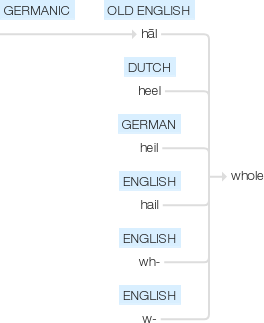Whole
Old English hāl, of Germanic origin; related to Dutch heel and German heil, also to hail2. The spelling with wh- (reflecting a dialect pronunciation with w- ) first appeared in the 15th century.
wiktionary
From Middle English hole(“healthy, unhurt, whole”), from Old English hāl(“healthy, safe”), from Proto-Germanic *hailaz(“whole, safe, sound”) (compare West Frisian hiel, Low German heel/ heil, Dutch heel, German heil, Danish and Norwegian Bokmål hel, Norwegian Nynorsk heil), from Proto-Indo-European *kóylos(“healthy, whole”). Compare Welsh coel(“omen”), Breton kel(“omen, mention”), Old Prussian kails(“healthy”), Old Church Slavonic цѣлъ(cělŭ, “healthy, unhurt”). Related to hale, health, hail, hallow, heal, and holy.
The spelling with wh-, introduced in the 15th century, was for disambiguation with hole, and was absent in Scots.
etymonline
whole (adj.)
Old English hal "entire, whole; unhurt, uninjured, safe; healthy, sound; genuine, straightforward," from Proto-Germanic *haila- "undamaged" (source also of Old Saxon hel, Old Norse heill, Old Frisian hal, Middle Dutch hiel, Dutch heel, Old High German, German heil "salvation, welfare"), from PIE *kailo- "whole, uninjured, of good omen" (source also of Old Church Slavonic celu "whole, complete;" see health).
The spelling with wh- developed early 15c. The sense in whole number is from early 14c. Whole milk is from 1782. On the whole "considering all facts or circumstances" is from 1690s. For phrase whole hog, see hog (n.).
whole (n.)
"entire body or company; the full amount," late 14c., from whole (adj.).
